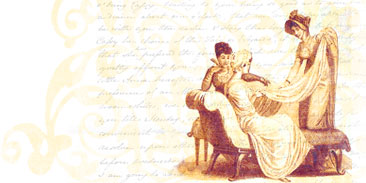Jane
I cannot begin to reckon the number of times I have wished to have a different life, to be someone, anyone, but myself, especially in those dark days after I broke faith with Edgeworth. How could I know what the price of such a wish would be, that I would awaken in a body and a life and a time that is not my own, and that everyone I know would be lost to me, perhaps forever? Yet there is much about this future world of light and noise and confusion that is not disagreeable. Even my most fanciful imaginings of a different place and time could not possibly prepare me for a world in which four more novels by the author of Pride and Prejudice and Sense and Sensibility exist, a world in which wondrous machines act out those stories, play music, and even wash clothes. A world of unparalleled freedom and boundless possibility, a world where I can go anywhere, do anything. A prospect that is as exhilarating as it is terrifying.
Courtney
This is the lady whose life I have inherited, a lady whose blond hair and round form is of a style of beauty that I have always wished were my own. Yet this lady may not be a lady at all, if I am to judge by her pursuits, her situation in life, and her lack of servants. Worse still is the fact that she ruined herself with the man she was to have married, yet refused to marry him.
And yet–this is the lady whose life is now my own, whose history is now my history. Is not her choice to refuse a marriage that would bring her respectability without happiness one that many ladies of my time wished that they could make? And can the gulf between us be as wide as I believe it must be if she has a passion for the author of Pride and Prejudice and Sense and Sensibility?
Edgeworth
I used to believe there was little reason to marry other than as a means of escaping my mother’s rule. And then I met Charles Edgeworth, a gentleman whose mind and manners were as captivating as his person. He was the first man of my acquaintance who appeared to want more than a pretty girl with all the usual accomplishments. He truly valued my mind, my taste for reading, my opinions. Although at first I could not see how a widower who had truly loved his wife could possibly form a second attachment, I came to see that he, like Colonel Brandon of Sense and Sensibility, could truly love more than once. Or so I thought. For on the day I was to accept his offer of marriage, I happened upon him with another woman.
Wes
He is kindness and generosity itself, this oddly dressed, bespectacled man with his head of tousled curls and his gray-blue eyes. I cannot deny that I am forming an attachment to him, yet Courtney’s friends Anna and Paula insist that I be on my guard, for they say that Wes lied to Courtney to protect Frank, the blackguard to whom she was formerly betrothed. It does not seem that anyone with so much goodness in his countenance can be so very bad, but then again, I could have said the same thing about Edgeworth, the man I loved back home.
Even if Wes is indeed as good as I hope, what respectable man would want anything to do with a woman who is ruined? How am I to make sense of a world in which people “have sex” as easily as they have cake, and where such inclinations have little to do with matrimony? With only the words of Miss Austen and the incomprehensible rules of Courtney’s “self-help” books to guide me, I cannot help but wonder if I would be better off in my own time. That is, if returning is even a possibility.
Paula
When I first set eyes on Paula, all I could see was a wild-looking creature with pink and blue hair, painted lips, and shockingly bare legs. To crown the whole, she most warmly protested against Wes as a suitable friend whilst taking me to see a doctor who prescribed a pill with a most disagreeable result. Nevertheless, I do believe that as misguided as Paula is, she has a warm heart and a keen interest in my welfare.
Anna
Although her attire is as immodest as Paula’s, her manners are gentle and kind. She, like Paula, is not someone in whom I confide about my feelings for Wes—she has as little esteem for him as Paula. However, I shall never forget the wise words she said to me that very first day we met: “Each of us has the power to create heaven or hell, right here, right now.”
Deepa
I never dreamt I would be so fortunate as to find a friend as true and as faithful as my dearest Mary, whom I left behind in 1813. And then there was Deepa, who showed me that a lady may serve drinks and still be a lady, and that divorce need not mean scandal and poverty. Deepa has taken me places I never imagined: public assemblies that pulsate with pounding music I can feel in my bones, sea bathing in an ocean above which winged machines soar, and a little room in the back of her club where resides a most extraordinary lady.
The Lady
She and I have met before, in 1813. Her talent for changing her person and for speaking truths about me which she cannot possibly know is both frightening and fascinating. Visiting her, with her india muslin gown and her chimneypiece and her tea service in the middle of a vastly different future world, is at once as comforting and unsettling as her counsel.

